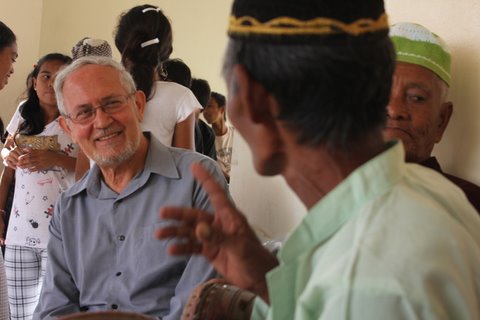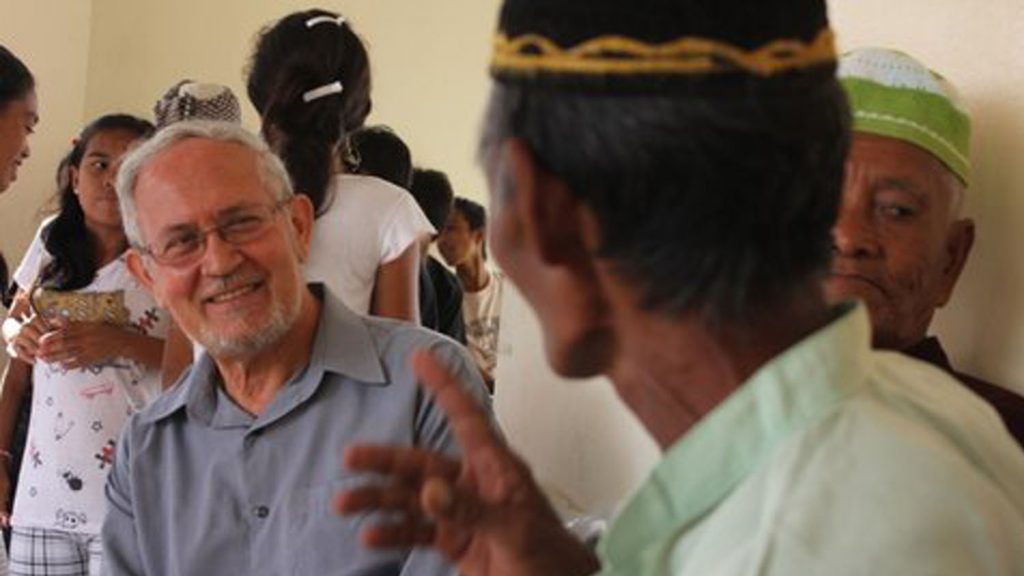
Father Sebastiano D’Ambra (left), founder of the Silsilah Dialogue Movement
In this last Oasis News for 2018, we present an interview done to Fr. Sebastiano D’Ambra, PIME, the founder of the Silsilah Dialogue Movement by journalist Cristina Uguccioni and published by the Vatican Insider.
Stories of coexistence between Christians and Muslims. A trip to the island of the Philippines, wounded by the Islamic radicalism violence, where Father Sebastiano D’Ambra founded a movement that promotes the spirituality of dialogue
“To those who ask me why I continue in this mission or why I did not throw in the towel after the murder, in 1992, of my dear friend and brother Father Salvatore Carzedda, I simply answer in this way: I trust that the good seeds of peace that we are sowing will bear fruit; I trust that love, not death has the last word: and that is what I try to bear witness to with my life. I believe that in the heart of every person, even the most evil one, there is a corner of goodness to unearth and foster. I believe that living together, as brothers, is possible, and also beautiful. The authorities would like to assign me an armed escort because I have received death threats, but I have refused: my life is in the hands of God. As history is in His hands: I don’t know therefore what will happen on this island in the next few years, but I have the duty to go on following Christ who commanded to love everyone, even enemies”.
Sebastiano D’Ambra: 76 years old, missionary of PIME (Pontifical Institute for Foreign Missions) since 1977 he has been working in the Philippines. In 1983 he settled in Zamboanga City, a city of one million inhabitants (60% Christians, 40% Muslims), located on the island of Mindanao, where the Muslim presence – contrary to what happens in the rest of the country – is very substantial; an island that, the priest stresses, “has not found peace for decades”. In 1984 Father Sebastiano founded the Silsilah Dialogue Movement, a movement that aims to promote peace and dialogue between Christians, Muslims and the faithful of other religions; a movement that with mild obstinacy is building peace and peaceful coexistence.
Over the decades, how have relations between Christians and Muslims on the island of Mindanao changed?
“The quality of coexistence is constantly evolving and certainly not the same I found 40 years ago. In some ways it has worsened because here, as in the rest of the world, radical Muslim movements, even violent ones from abroad, have begun to spread for some years now. In 2017, to cite one of the most serious events of recent times, the island was wounded by terrible violence perpetrated by a group of extremists affiliated to the so-called Islamic State who wanted to constitute a caliphate and have put the city of Marawi to fire and sword sowing death and destruction. The government intervened very harshly and after five months won the day. But the signs of devastation, both on people and buildings, are still clearly visible. Relations between Christians and Muslims are conflicting or peaceful, depending on the case: the Islamic community is not a monolith, there are many moderate faithful, who want to live in peace with Christians and are tired of the violence, but also extremists with whom living together is difficult”.
Why did you decide to create the Silsilah Movement?
“When I came here in 1977, a revolution was underway promoted by the rebels of the Moro Islamic Liberation Front (MNLF): in the village where I lived, with a Muslim majority, I began to know the indigenous Muslim groups and rebels. I was asked to mediate between the government and these rebels and I accepted the task. In 1981, also thanks to my intervention, an agreement was reached, but this work of mediation had exposed me very much and I was ambushed, so, at the request of my superiors, I returned to Italy. I studied at Pisai (Pontifical Institute of Arabic and Islamic Studies) deepening my knowledge of the Islamic world. Later, after some experiences in Arab countries, I returned to the Philippines, to Zamboanga, and in 1984 I decided to give life to the Silsilah Movement, a term that means “chain”, it means that humanity forms a chain, that we are all creatures of God linked to each other. I wanted to give life to this movement because I believe in the spirituality of life-in-dialogue, dialogue with God, with oneself, with others, with creation; I believe inter-religious dialogue is the way to peace”.
The Silsilah Movement pays particular attention to formation: what are the main initiatives promoted in this area?
“Dialogue cannot be improvised, for this reason we take great care of formation. We organize various courses in which Christians and Muslims not only from Mindanao, but also from other parts of the Philippines and abroad, participate. In addition to seminars and workshops, every year we hold a monthly course that allows us to deepen our mutual knowledge and the spirituality of dialogue and proposes the history, the sacred texts, the fundamental principles of Christianity and Islam. During this month, on weekends, Christian students live in families of the Islamic faith while Muslim students are welcomed by Christian families. We also offer intensive weekly courses and courses that each year deepen a different theme. We have also decided to offer lessons reserved for teachers of the Christian and Muslim religions”.
How many people are part of the Movement today?
“It is difficult to indicate a precise number: I know that there are now many of them. The Movement can count on a small leading group, which includes Christian and Muslim people (among them also some imams), and a few thousand Christian and Muslim members present not only in Mindanao but in all the Philippines: they are former students and friends who have made the spirituality of dialogue their own and have committed themselves to living it and spreading it, through various initiatives, also working in groups, where they live. I would like to stress that among the Christian and Muslim members linked in various ways to the Movement, solid friendships have been established: peaceful coexistence is possible and is also fruitful”.
In which social works are Christians and Muslims who are linked to the Movement involved?
“In the poorest areas of Mindanao, for example, we follow together some kindergartens and we also assist people in need with the distribution of food. We also promote the care and protection of the environment and to this end we organize courses in biodynamic agriculture for the poorest farmers in our Harmony Village, a community on the outskirts of Zamboanga built on land that was donated to us. Among the many assistance projects we have promoted, one is aimed at 50 Christian and Muslim children who were orphaned a few years ago as a result of hard clashes between Christians and Muslims in an area of the city: we are supporting them in their studies and growth. Today it is moving for me to see how these young people are bound by deep friendship while their fathers were divided by incomprehension and hatred. Moreover, we carry out a capillary educational action in schools”.
The school plays a fundamental role in building a peaceful and cohesive society.
“Certainly: for this reason we collaborate with numerous schools and universities by organizing meetings and seminars. We have also written a dialogue training manual that teachers can use to teach peace. In 2010, the United Nations promoted the World Interfaith Harmony Week, a week held every year in February, dedicated to the love of God, of our neighbor and of the common good. Our Movement has promoted this special week here in the Philippines and organises formation meetings and solidarity activities involving schools and universities throughout the country. I was recently appointed secretary of the Commission for Interreligious Dialogue of the Philippine Episcopal Conference which, every year, chooses a theme to deepen: the theme of the year 2020 will be interreligious dialogue and we are preparing initiatives that will also involve young people. In addition to all the initiatives I have mentioned, there is a daily initiative that I consider essential: prayer. In the Philippines and in other countries there are also groups linked to our Movement that pray for peace. Prayer is a powerful weapon, the only one necessary”.

